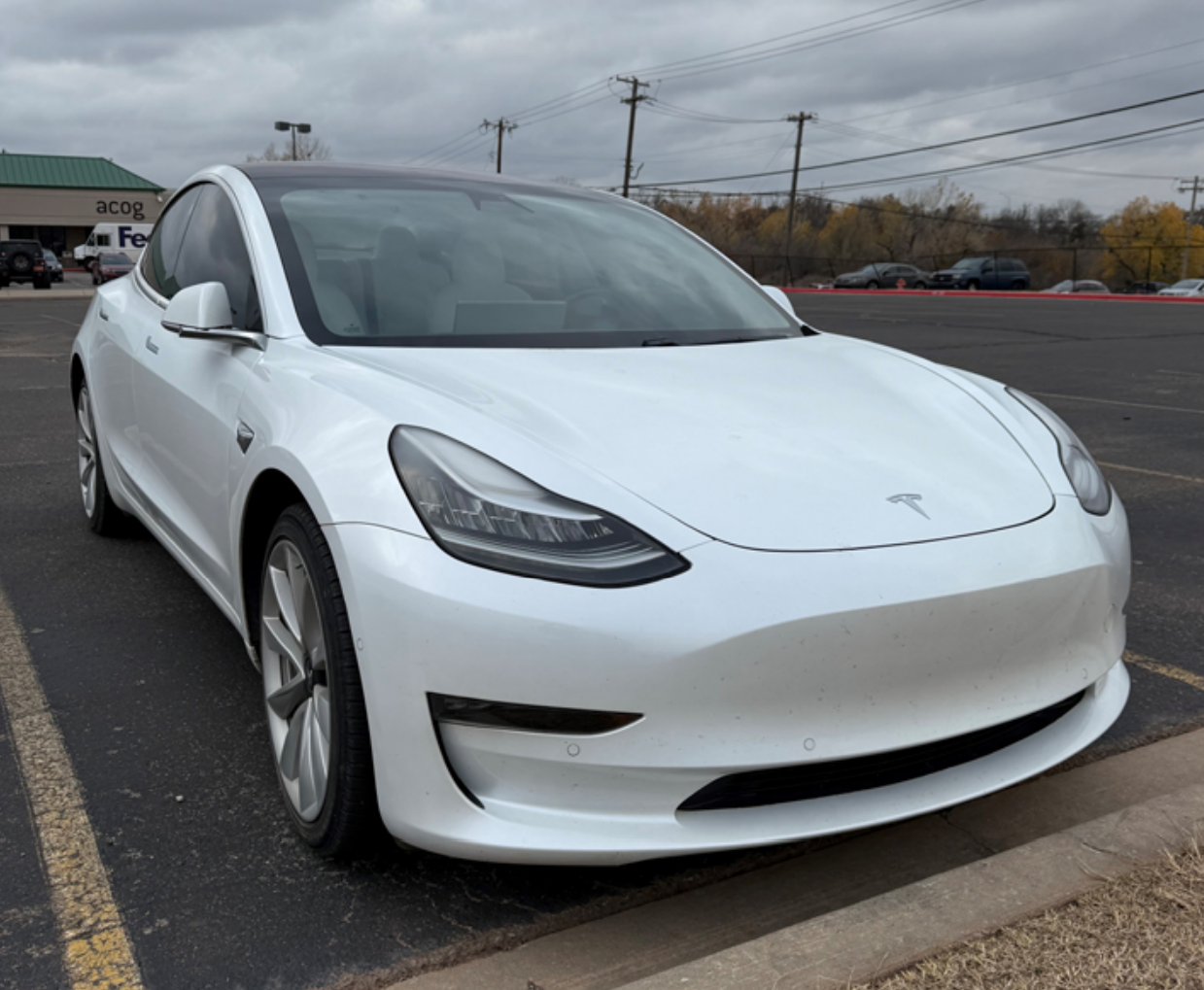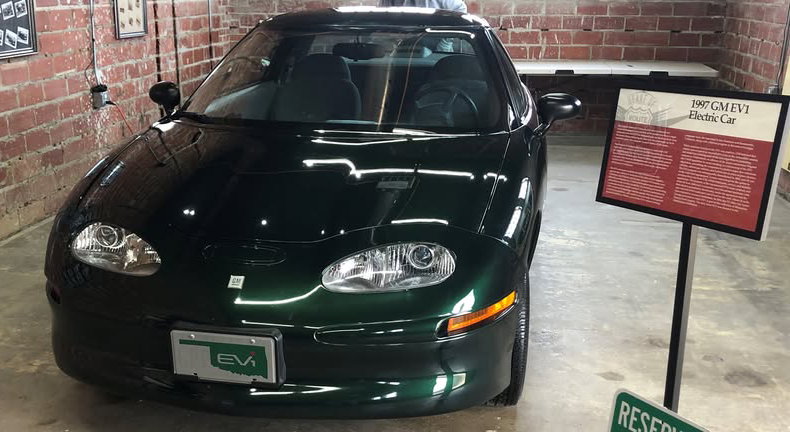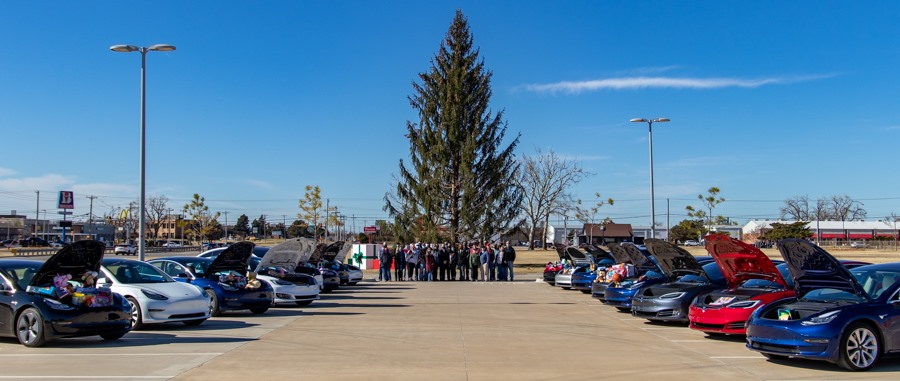Get Involved
Email: driveEV@acogok.org
Tell Your Story
Email your EV story in for a chance to be featured here on our website!
I have owned an EV for 5 years. I have a 2018 Tesla Model 3 medium range. Its initial range was about 260 fully charged. That really hasn’t diminished since the time I first started driving it. I generally charge it to 80 percent of the battery; this was recommended for longer battery life. My driving habits are fairly consistent as I drive about 46 miles roundtrip each day. At first, I just plugged the car into a 110 overnight and nearly went back what I used for the day.
Eventually, I upgraded to a 220 socket, as I got an electrician out to the house to install it. The local co-op (OEC), is great to work with, gave me a reduced cost for charging during nighttime and a partial rebate on the installation. I charge my car 99 percent at home. As I stated, I generally use this as a work vehicle and then running errands on the weekend. I am not a Dallas shopper, so long range trips are not too much of a concern. I do enjoy the acceleration of the car and the handling. I enjoy driving and don’t have the fully self-driving option. There are several safety features that I like, but I generally prefer to trust my own driving. I think we are still some years away from “safe” self- driving vehicles.
Last year, we invested in solar for powering the house and purchased a battery backup. Approximately one-third of that cost was given as a credit on our federal taxes. Probably 10 months of the year, excess power is provided by the solar panels, which power the house and the EV. Then the additional power generated by the system is purchased by my cooperative on behalf of WFEC.
My wife and I drive less than 10,000 miles a year total for both vehicles we own. Until we bought our used 2019 Hyundai Ioniq (all electric BEV) through Carvana in March 2024 we had two beat up 10+ year old vehicles. Not having a car payment was nice but the driving experience was not. Because of the ‘Happy Wife, Happy Life’ principle, she usually gets to drive the newer model year EV for errands, etc., despite working fully remote. I have an 18 mile round trip daily commute. We mainly bought an EV to reduce the negative environmental impacts of driving a gasoline vehicle.
Owning and operating an EV has mostly been unremarkable, but in a positive way. We charge somewhat sporadically at home on a 110V outlet but the car is till mostly fully charged. It took about 3 minutes to program the vehicle to only accept a charge during utility offpeak hours as we’re on a time of use electricity rate. At some point, I’ll call my utility provider to make sure we’re getting the best rate as an EV household. Fewer trips to the gas station, one less vehicle that needs an oil change. Warming up and cooling down the vehicle in the garage without worrying about exhaust filling our home. I like the beefy regenerative breaking for city driving. Instant acceleration is outstanding especially on highways but I’ve had to be careful about speeding because I don’t have any guilt about burning excess fuel putting pedal to metal.
I don’t foresee us ever buying a non plug-in vehicle moving forward. At some point (maybe after the first full year of ownership) I’ll try to make some calculations on how much we’re saving on fuel cost, but that wasn’t the primary motivator. We’ve used level 2 charging occasionally, but only twice when we even needed it. We learned the hard way on a drive from OKC to Claremore that the vehicle had an issue getting a fast charge (should have done a test charge before hitting the turnpike) – got there thanks to some level 2 which delayed our arrival by a few hours. Took the car to a dealership upon our return home to determine the issue and they ordered a part (under warranty) that hopefully will fix the issue.


Local Chapters: Community Based Organizations
Electric Vehicle Association of OKC (EVAOK)
The Electric Vehicle Association of Oklahoma City (EVAOKC) is a non-profit supported by donations of those interested in furthering the adoption of electric vehicles. It is proudly a chapter of the National Electric Vehicle Association and provides a forum for EV owners and enthusiasts to connect, ask questions, share experiences and stay informed about EV topics and issues.
Electric Auto Association: Oklahoma Electric Vehicle Owners & Enthusiasts (Facebook group)
This is an online group is for electric vehicle owners and enthusiasts to connect and discuss everything Oklahoma related in the EV world. From charging locations to Tesla to conversions to leafs and volts.
Tesla Owners Club of Oklahoma (TOCO) / (Private Facebook Group)
This group is moderated by the Official Partner of the Tesla Owners Club Program. To become an official member of the Tesla Owners Club of Oklahoma (TOCO) please visit OKTeslaOwners.com to join! This is a private group for Tesla owners that reside in Oklahoma.
Contact us
F.A.Q.
Are EVs More Expensive than Gas Powered Cars?
Electric vehicles come in a wide range of prices, starting around $32,570 for the Nissan LEAF, which is fully electric. If you look for used EVs, you might find some for as low as $16,500, depending on location and seller.
In terms of daily costs, EVs are cheaper to drive. On average, a gas car costs about $0.13 for every mile you drive, while an EV can cost as low as $0.05 per mile.
EVs require less maintenance because they don’t need oil changes and have fewer parts that need to be replaced. While the upfront cost of some EVs might be high, they can be cheaper to use and take care of in the long run.
How Far Can an Electric Vehicle Travel?
Range is one of the most important stats you will need to compare when shopping for an EV. Modern EV models have a range of 100+ miles, 240+ miles, and some longer-range models can travel up to 400+ miles on a single charge, making them highly competitive with gas powered vehicles.When considering EVs, it is important to consider your mileage needs and daily driving habits. An EV with an extended range can offer anywhere from a few tens to hundreds of miles more range than a standard EV, depending on brand, make, and model of the EV.
You can learn more at EPA’s range ratings where it is easy to compare EVs and their ranges currently on the market.
Do EV Owners Pay Taxes on Road Repairs and Infrastructure?
Yes. EV owners pay an annual fee and a tax when using public chargers, contributing to road repairs and infrastructure funding. Oklahoma House Bill 2234 creates the Driving on Road Infrastructure with Vehicles of Electricity (DRIVE) Act of 2021. The measure levies a $0.03 tax per kilowatt hour or its equivalent on the electric current used to charge or recharge the battery or batteries of an electric vehicle beginning January 1, 2024. This tax shall not be applicable to electric vehicles charged at a private residence. Any tax revenue collected shall be apportioned to the DRIVE Revolving Fund and counties throughout the state. Oklahoma Statute 68-6511 ( Title 68, pg 1536) declares EV owners must pay an annual vehicle registration fee in addition to standard vehicle registration fees. Revenue from the fees shall be allocated to the Driving on Road Infrastructure with Vehicles of Electricity (DRIVE) Revolving Fund. Fee amounts vary depending on the gross vehicle weight rating (GVWR) of the vehicle.
Class 1 electric vehicle’s annual fee is $110 (equivalent to annual oil change costs). Class 1 plug in hybrid electric vehicle annual fee is $82.
Does Oklahoma Have Incentives for Installing Home Charging Stations?
Yes. Although they are offered through utility companies rather than the state government. Check with your utility provider to see if you qualify today.
Why are EVs Good for the United States?
EVs promote U.S. energy independence and security as the fuel (electricity) is produced locally, thus there is no dependence on foreign oil. More zero tailpipe emissions on the road helps improve air quality and public health.



